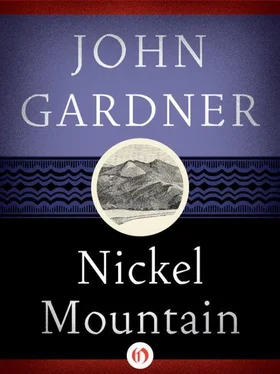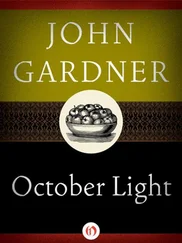Callie and the child disappeared behind the middle grocery shelf.
“Pack of Old Golds,” he said. “Regular.” His knees were shaky.
When he went out on the porch he saw Henry Soames sitting in his car, the flesh sagging from around his eyes, his skin unhealthy gray. He was huge and old as the mountains, and as patient. Their eyes met, but Henry Soames showed no sign of recognition, merely looked puzzled, reminded of something.
We were friends, Willard thought. We used to talk half the night sometimes. I worked on my goddam jitney in your garage.
He thought of the red-headed policeman, smiling, pretending to listen to nothing he said, and a chill went down his back. He thought of waving, as if noticing Henry only now. But it was too late. He went down the steps and walked across the road, opening the cigarettes as he walked. He could feel the old man’s puzzled eyes on him, watching.
Shit passing in the night, he thought. He lit a cigarette, and it tasted worse than most.
Then, behind him, Henry called, “Willard?”
He froze, scared sick, his knees shaky. As soon as he was able, he dropped the cigarette and turned around. Henry was half out of the car, grinning, calling “Willard, you devil!” Callie and James were on Llewellyn’s porch, watching like small, gentle statues from a church.
With more self-control than he’d have thought he could muster, Willard raised his arm and waved and then, without thinking, smiled at them. And then — who knows why? — he turned his back and began to run, ashamed of doing it even as he did it but also full of crazy joy. They’d forgiven him. Of course! Why shouldn’t they? Wouldn’t even he — even Norma, in fact — have done the same? He kept running, bringing his feet down hard on the road’s packed-tight snow. When he was over the hill and around the bend, protected from Henry Soames’ eyes by trees, he slowed down to a walk and thought, still smiling, “How absurd, all these years! A foolish nightmare, a sad, shoddy dream out of Plato’s cave!” The day was bright, surprisingly warm, and the three-mile walk ahead of him seemed nothing. He crossed the bridge, hardly noticing, hurrying. “I was insane,” he thought, startled. “It’s as simple as that! I must remember, from now on. Whatever happens, I must remember.” It came to him that he’d promised his mother he’d pick up something if he stopped at Llewellyn’s. Was it baking soda?
And now, behind him, he heard Henry Soames’ car coming noisily after him. They’d insist on giving him a ride, of course. There was no escape, nowhere to hide — if he ran for the woods they’d see him and think he was crazy. Willard laughed, blushing till his cheeks were like a girl’s, then turned and flung up his arms in submission. The Ford came beside him, clanking and growling like the hound of heaven.
“Willard, you old son-of-a- gun,” said Henry Soames.
All morning there had been a gray truck parked in the cemetery on the mountainside across and a little down from where they hunted, and fifteen feet this side of the truck two men were digging a grave. Henry Soames wondered about it from time to time, when he sat resting for a minute on a rock or when he stood helping his boy with the rifle. They were burying someone he knew, most likely — only people from close around used the cemetery — but he couldn’t think who it would be. Henry was always one of the first to hear about births and deaths, partly because of his running the diner (as he still sometimes called it, though the big sign in front of the new building said RESTAURANT, and it was no longer the Stop-Off but The Maples, which was more elegant, Callie said), but mainly because Henry Soames was the kind of man he was, interested as a spinster aunt in the life of the whole county and a partisan. Maybe it was Charley Benson’s mother, it came to him after a while, and, not realizing he was doing it, he took off his cap and held it over his stomach a minute, thinking and looking at the ground. She was ninety-seven, and likely to go at any time. But it was odd that he hadn’t heard. Maybe on the way back home he and Jimmy would cross over to where they were digging and find out for sure.
They were regular, hired grave-diggers, not relatives or friends of the family: They had a shade-canvas up, and they worked slowly and steadily. Over their heads the sky was bright blue, like the middle of summer, with a long, pale mare’s-tail off to the west, and the maples, exploding to red now, were as motionless as trees in a dream. The shade under the trees looked cool and comfortable (here in the open it was hot as a day in the middle of August) and he thought of the creek over there, out of sight from where he stood, and the thought made him thirsty. The tombstones would be smooth and comfortable, some of them, for sitting on.
Jimmy seemed not to have noticed the truck, or at any rate he hadn’t grown curious yet. A boy’s curiosity took time to move out from wherever he happened to be standing, if where he was was unfamiliar. He wanted to know why the old barbwire fence was here, where as far as a four-year-old boy could see there had never been anything but stiff gray weeds and berry bushes and big rounded rocks. (There’d been a house here, years ago, a place where three old-maid sisters had lived, named Riddle. You could still find the chimney, down under the woodbine and burdocks, if you looked, and you could see where the road had been, and three of the stone supports of the smokehouse. There was one old pear tree, dead and white and brittle as bone, standing all by itself in the brambles like a stubborn old Baptist waiting for the Judgment.) The boy wanted to turn over every old stick or flat stone they found to squat down with his arms on his knees and study the crawling things underneath. Henry would stand patiently or would sit, if there was a stump handy, giving his son his way. It was good for a boy to look things over. And then, too, Henry could use the rests. As it was he was farther from home than Doc Cathey approved of his going. He could look behind him and see his house and restaurant a half-mile down, way to the right of the cemetery, over by the highway: the house a little white box in the shade of maples and three pine trees scraggly with age, no grass around it to speak of, cinders instead for the trucks to park on — in front of the house and off to the left the red walls and the black roof of the restaurant. There was only one car there now, a Volkswagen; no one he knew. He looked over at the grave-diggers again and shook his head.
Then Henry forgot about the cemetery for a while. In spite of the noise they’d been making shooting at cans and sticks, earlier, a rabbit walked right out in front of them, and Henry fired at it. The rabbit flipped when the bullet hit and flopped around in a half-circle, dead already, and lay still. They went to pick it up.
Any other time he might have picked it up at once, almost without looking at it, and might have stuffed it into his canvas bag and might have forgotten about it. But the boy hadn’t seen a dead rabbit before — hadn’t seen anything dead, in fact, as far as Henry Soames knew, except maybe flies — and so Henry stood with the rifle clamped tightly under his right elbow, barrel out, pointing off to the right, away from the boy, and held the rabbit on his open left hand for the boy to see and touch. He watched the boy’s face and for an instant he felt himself slipping away again into that sense that he stood outside time, involved and yet dispassionate, like a man looking at far-off mountains, or like Henry Soames’ father sitting motionless and huge on a broad stump, watching chipmunks or listening to the brook move down through the glen, rattling away forever, down and down. Or as Henry himself sat nowadays, more and more, thinking thoughts that had never before occurred to him, surprised and bemused at the way things fit together. He saw the boy’s face as though it had nothing to do with himself, a face in an old, old photograph. His hair was the color of clean old straw, white almost, but with yellow glints and dust-gray shadows. It needed cutting; that was the way his mother liked it. His blue eyes had a pink cast, as they always did when the light was strong, and his eyebrows, white against the flush of his face, lifted up and out like wings. He stood bent forward, his trousers halfway down his hips, his hands behind his back in one of those old-man poses he was always getting into, and he looked at the rabbit with curiosity and no distaste. For him, too, the sun had momentarily paused, if it ever noticeably moved in a four-year-old’s world. At last, tentatively, he touched the soft, short fur on the back, gray-brown fur speckled with a pure white (the rabbit was young), and stroked from the tips of the ears to the turned-down tail. The bullet had hit in the neck, snapping it clean, and the head lay now at an angle not natural in life, as though the back of the head rose straight from the shoulders, as if in ecstasy. There was very little blood: a stain around what seemed the insignificant wound on the side of the neck.
Читать дальше











